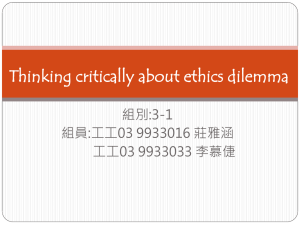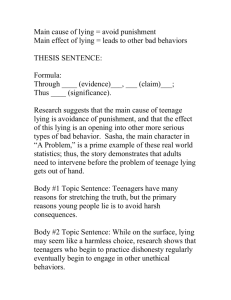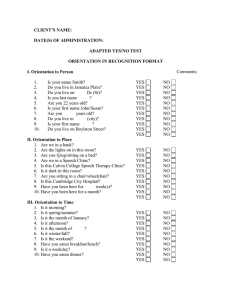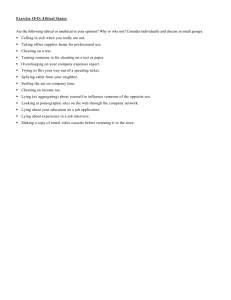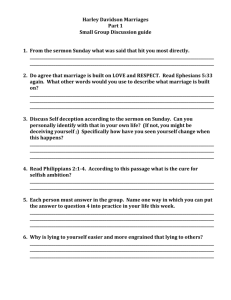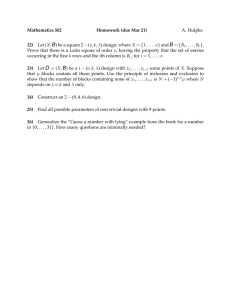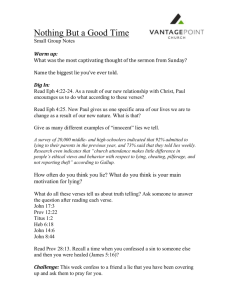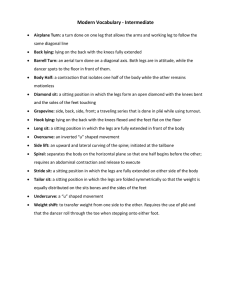Surgery - Unit 5
advertisement
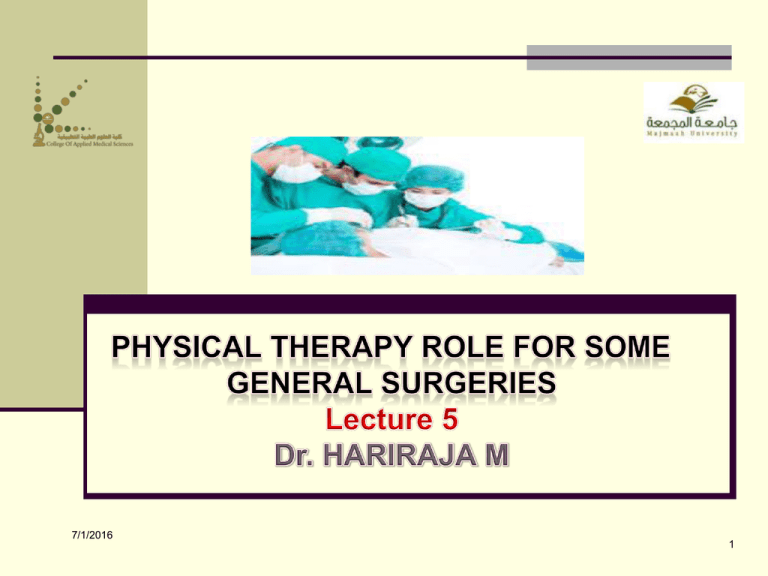
7/1/2016 1 Cholecystectomy is the surgical removal of the gallbladder, which is located in the abdomen beneath the right side of the liver. •Gallstones (may block the flow of bile from your gall bladder). •Cholecystitis (inflammation of the gallbladder). •Cholangitis (inflammation of the bile duct). Infection Risks from general anesthetic Bleeding Bile leakage Injury to the bile duct Injury to intestine, bowel and blood vessels Deep vein thrombosis In laparoscopic Approach The surgeon will make three to four small incisions and insert tube-like instruments through them. The abdomen will be filled with gas to help the surgeon view the abdominal cavity. A camera will be inserted through one of the tubes to display images on a monitor located in the operating room. In open cholecystectomy A large incision is used which may be either right upper paramedian or right oblique subcostal incision . If the procedure is performed laparoscopically the incisions will heal well, leaving small discrete scars. If the open method is used, a larger scar will be present. Physical therapy rehabilitation after cholecystectomy First 2 postoperative days: Usually, intravenous therapy is used on the 1st day, and one of the Patient's arms or legs is immobilized. For this purpose, A Ryle's tube may be in position for intermittent aspiration of the stomach remnant. Primary Aims •To decrease postoperative pain. •To accelerate wound healing. •To prevent respiratory complications. •To prevent circulatory complications. Physical therapy rehabilitation after cholecystectomy Modalities of treatment: •TENS: Electrode placement: para-incisional Pulse duration: 8 pps Pulse rate: 40 HZ Amplitude: comfort (submotor ) Duration and frequency of treatment: 20- 60 min/ 3-4 times according to the case. Physical therapy rehabilitation after cholecystectomy Laser:• Purpose of application: Wound healing. Dosage: 90 sec/cm2 Distance from the skin: 2—3 mm. Mode: continuous mode. Power: I m\V. Pulmonary physical Therapy • It should be noted that diaphragmatic breathing is shallow on 1st postoperative day and may be impossible to obtain so we use spirometer training. incentive Physical therapy rehabilitation after cholecystectomy Foot and leg exercise (circulatory exercises) It includes the following exercise 1- lying alternate ankle Bending. 2-Lying: alternate foot turning inward and outward 3-Lying : single foot circling. 4- lying: single slight knee raising and lower followed by brief leg down pressing. 5-Lying: single and double quadriceps contraction 6-Lying:combined quadriceps and gluteal contraction 7- Sitting over edge of bed alternate ankle bending and stretching 8- Sitting over edge of bed: alternate leg swinging 9-Sitting out of bed 10-sitting out in chair for about 10-20 Minutes Exercises period 15 To 20 minutes under supervision, two or three times daily. Physical therapy rehabilitation after cholecystectomy 3rd & 4th day postoperative days: The patient rests in bed between intervals of sitting out in a chair. Short periods off walking in the ward are encouraged. Primary Aims: •To prevent postoperative respiratory complications. •To prevent postoperative circulatory complications. •To maintain and improve the power of the abdominal muscle, particularly the oblique and transverse groups. Physical therapy rehabilitation after cholecystectomy Modalities of physical therapy: Pulmonary physical therapy • A incentive spirometry training as described before. • Glossopharyngeal breathing (GPB): Is a substitute method of increasing the volume of air that is brought into the lungs by about 1000 cc. Procedures The patient take several gulps of air then the mouth is closed and tasks the patient to trap the air in the lungs. Circulatory exercise• Is described earlier Physical therapy rehabilitation after cholecystectomy Exercise therapy 1.Crook lying: hand on abdominal muscles and make contraction.• 2. Stride lying: trunk turning with single arm carrying across the chest. 3. Lying: head bending forward with single high knee raising. 4. Lying; slight chest raising . 5. Crook lying; pelvis raising. 6. half lying; single or double ankle bending. 7. Half lying; single or double foot turning inwards. (20 min, twice daily) . : Usually the Stitches are removed on the 10th postoperative day. depending on the patient condition and the surgeon opinion. Primary aims: I- to improve posture. 2- to improve muscle power of trunk 3-to prevent pulmonary complications Modalities of treatment Trunk exercise Position patient in bed lying; trunk turning with head bending forward single arm across the chest Lying; single high knee raising leg stretching forward to 45 and slow lowering. Lying (hands grasp edges of mattress); tipper trunk turning forwards with assistance from arms. Lying: chest raising. Modalities of treatment b— Patient sitting in chair: Stride sitting; trunk turning with arm moving loosely sideways in the direction of hands to grasp the chair back. Stride sitting; trunk bending sideways. Stride sitting (hands on thigh); trunk bending forwards and downwards. c- Patient standing: General correction of posture in standing and walking. Walking practice. Modalities of treatment Pulmonary physical therapy: Resisted breathing exercise either manual or by using Mechanical weight. Placement of resistance; at epigastric area. Weight graduation: for manual resistance mild, moderate, and maximal. For mechanical weight—> 1/2, 1, 1.5,2Kg. It must be noted that the patient must gain full diaphragm excursion before increasing the load offered whether manually by the therapist hand or mechanically by external weight.
